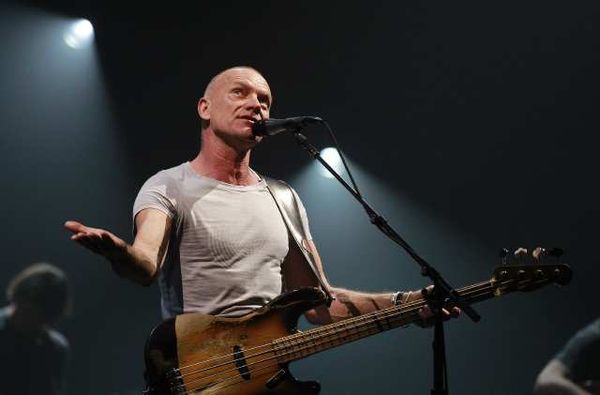|
Live review: Sting at the Wiltern
Posted on: 12/06/11
 Sting has long been a card-carrying member of rock’s aristocracy, so even turning up uber-casual in a humble gray T-shirt and blue jeans, as he did Monday for the first of three sold-out nights at the Wiltern theater, he’s never going to come off as an Average Gordon. The tacit -- and witty -- message underlying Sting’s new Back to Bass tour is that he’s returning to the fundamentals of his music, signaling fans that he won’t be inundating them with flights into jazz-rock, touring with a symphony orchestra or breaking out an archlute to experiment with medieval troubadour balladry, as he’s been wont to do. To a significant extent, that’s what the packed house got in a set that ran nearly two hours and included a generous dose of the hits that originally endeared him to audiences as the intensely charismatic frontman for the Police, and then as a boundary-bending solo artist. Few rock stars could pull off a song introduction like the one he delivered leading into “Fields of Gold,” that exquisitely romantic 1993 hit whose lyrics could well have come from the pen of a 15th century troubadour waxing poetic about the British countryside's natural beauty. He said the song had been inspired after he and his family moved to a new house. “More of a … castle really,” he confessed, a shred of apology slipping through the wry delight he displayed as he said it. Sting is an aristocrat musically, temperamentally and officially, ever since the queen made him a Commander of the British Empire in 2003. No dressing down fashion-wise is going to mask that. Especially not when he casually trots out songs such as “Seven Days,” with its intricately complex rhythmic structure and art-song narrative form. His freedom to take off on such journeys was aided by the fearless instrumental support of his five-piece band; on "Seven Days" in particular by drummer par excellence Vinnie Colaiuta. Father-son guitarist Domenic and Rufus Miller added a family band vibe to the night, multi-instrumentalist Peter Tickell supplied pyrotechnics in particular on a couple of extended fiddle solos, and singer-fiddler-percussionist Jo Lawry brought chemistry to her spotlighted exchanges with the boss. Yet Sting kept things from careening too far into the musical stratosphere by weaving them seamlessly in among equally inventive, but consistently catchy, pop-minded numbers. A couple of the numbers tapped the Police catalog (“Every Little Thing She Does Is Magic,” “Demolition Man”), but most of the others were from his 25-year-old solo career. That included “Fields of Gold,” the eerily atmospheric “Ghost Story,” the funky expression of love and lust that is "Sacred Love," and the show-closing encore performance of “Message in a Bottle.” On the latter, he stowed the bass and accompanied himself on acoustic guitar for the one fully solo performance of the night. This tour returns Sting to more intimate surroundings following the juggernaut of the Police reunion tour that inhabited arenas and stadiums, yet ironically, there were times Monday where he struggled to make a connection with the crowd. A few times he resorted to hand gestures to coax fans into singing along with refrains, or to engage with him in call and response. As Mark Twain so adroitly showed us in “The Prince and the Pauper,” it can be hard for the aristocracy to take the pulse of the common folk without going fully undercover. But as Sting left the stage after three curtain calls and a roaring concluding ovation, what sprang to mind were the words of another socially astute humorist, Mel Brooks: “It’s good to be the king.” COMMENTS
Be the first to post a comment! Post A Comment:

|
.gif)



.jpg)

